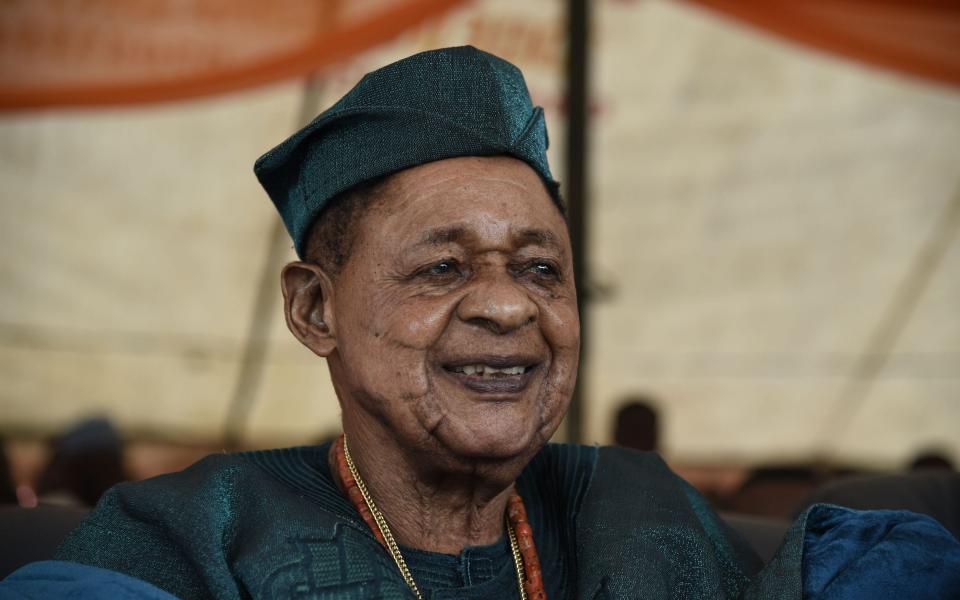The Alaafin of Oyo, monarch of an ancient African kingdom – obituary

Lamidi Adeyemi, the Alaafin of Oyo, who has died aged 83, was the traditional ruler of the ancient Oyo kingdom in Nigeria. As occupant of a seat that had survived for centuries into the modern republic of Nigeria, he wielded great influence as an authoritative representative of the interests and culture of the Yoruba people.
Adeyemi held the position of Alaafin of Oyo for 51 years, longer than any of his predecessors. By the time of his death, he was recognised as the most senior of Yoruba traditional rulers in a vast region in which almost every town has its own oba, or king.
He achieved this status by his sheer longevity (he outlived his main rival, Okunade Sijuwade, the Ooni of Ife), and by adroit political manoeuvring, safeguarded his position as chairman of the Oyo State Council of Obas and Chiefs (defying a civilian governor of Oyo State who tried to unseat him in 2011 for not supporting his re-election).
The Alaafin’s palace in the city of Oyo – today, a sprawling town of about 500,000 people – is said to be the largest in the Yoruba heartland in south-western Nigeria. Here, the Alaafin lived and maintained a tradition of kingship which held that, as the Yoruba historian the Reverend Samuel Johnson wrote in his The History of the Yorubas (1921), the Alaafin “is more dreaded than even the gods”.
Like his predecessors, the Alaafin had numerous wives (his father was said to have had 200), and a court of office holders and servants whose duties included singing panegyrics, playing trumpets and unfurling the royal umbrella. His fleet of cars bore licence plates that read IKU BABA YEYE – “Master of Life and Death”.
Under British imperial rule, which lasted from 1901 until Nigeria’s independence in 1960, the country was governed indirectly, with the minimum of resident officials from London. To achieve this, local traditional rulers were given official status and authority within the British protectorate.
The abundance of Yoruba rulers led to a system of ranking in which the Alaafin of Oyo was given first place, in recognition of the history and prestige of the Oyo empire and the Alaafin’s willingness to work with the British.
In the years after independence, the Alaafin of Oyo found his status as the first among Yoruba kings slipping in favour of the Ooni of Ife, traditional ruler of a neighbouring land that claims not only to be the cradle of the Yoruba people but also the birthplace of mankind.
The rivalry of the Ooni and the Alaafin, played out in contention for chairmanship of the Oyo Council of Obas and Chiefs, reflected two different aspects of Yoruba kingship: the Ooni of Ife represented the cultural and spiritual side of Yoruba heritage, while the Alaafin represented its historic political power.

Lamidi Olayiwola Atanda Adeyemi was born in Oyo on October 15 1938. His father, Adeyemi II Adeniran, had served as Alaafin from 1945 until 1954, when he was deposed by the British-controlled government in a dispute over the Alaafin’s powers.
The kingship of Oyo rotated among the eligible royal houses until Lamidi Adeyemi assumed the seat of Alaafin on November 18 1970. At the time of his coronation, Lamidi Adeyemi was 31 and working for the Royal Exchange Assurance company in Lagos.
In his youth, Adeyemi was a successful bantamweight boxer, and was selected to represent Nigeria in the Commonwealth Games in 1956. He was unable to take part because the Games clashed with school examinations, but he was a keen athlete for the rest of his life.
He was an admirer of Joe Louis (“he was the best, for artistry, footwork, superb boxing and athletic display,” he told an interviewer) and of the English champion Henry Cooper (“He had a perfect left hook that could put a man out with a single blow. He dropped Muhammad Ali with that left hook.”)
The Nigerian government recognised the Alaafin as a Muslim leader, and in 1990 he was appointed by Nigeria’s military ruler, General Ibrahim Babangida, as leader of the cohort of Nigerian Muslims making the pilgrimage to Mecca.
In 2014 he travelled to London with a quorum of his wives and made a trip to Westfield shopping centre. The Alaafin and his party, dressed in outfits of the same colourful printed cloth, were spotted by astonished British Nigerians who called out: “Kabiyesi!” – a traditional address to a Yoruba chief, meaning “you cannot be contradicted.”
Lamidi Adeyemi married Ayaba Abibat Nihinlola in about 1957; together they had three daughters and two sons. Ayaba Abibat was the Alaafin’s senior wife; he went on to marry a further 12 junior wives. The most recent of these was Badirat Olaitan Ajoke, who was 19 at the time of their marriage in 2010.
He had numerous children, whose exact number is uncertain.
The Alaafin of Oyo, born October 15 1938, died April 22 2022

 Yahoo News
Yahoo News 
